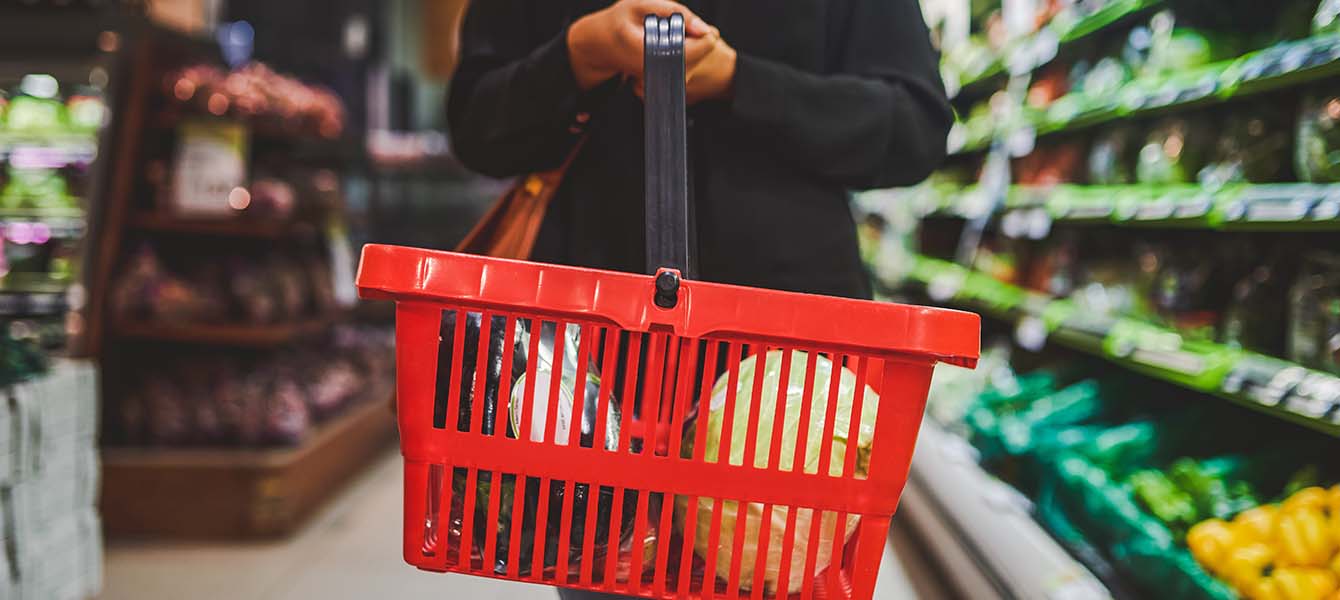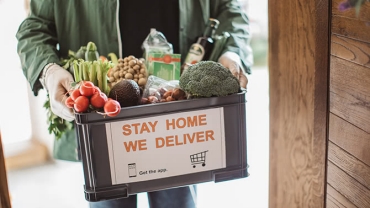
How the war in Ukraine affects food retail
06 April, 2022
The war in Ukraine continues to shock the world, and the effects are being felt by people around the globe. For example, energy prices have risen sharply since the end of February 2022, but groceries such as grain, meat, milk or vegetable oil are also becoming more expensive. An average German household must reckon with additional costs of up to almost EUR 3,000 a year. This development is a particular burden on people with low incomes.
Price increases have an impact on the consumption behaviour of consumers: they are increasingly buying products from current offers and opting for cheaper private labels from retailers. Indulgent luxury foods and rather expensive organic foods are becoming less important. Instead, consumers are once again seeking out discounters more frequently.

The most important details in 30 seconds
- The war in Ukraine is triggering rising energy and food prices, and it is adding fuel to an already high rate of inflation.
- As a result, an average household must expect additional costs of up to EUR 242 per month.
- The price increases are a particular burden on people with low incomes. Around one in four households can barely compensate for the additional costs.
- Consumers are adjusting their shopping behaviour to rising prices: around 58 percent are taking advantage of special offers when prices rise. 39 percent are opting for cheaper private labels when shopping.
- In this situation, discounters are gaining back lost market share: 27 percent of consumers are more likely to buy certain products from discounters when prices rise.
- Retailers can lure consumers with attractive offers and low-priced private labels.
Rising costs for energy and food are a burden for consumers
Consumers are currently feeling the effects of rising prices, especially at the pump and on their electricity, gas and heating oil bills. But food is also becoming ever more expensive: according to the Federal Statistical Office, the price increase for food in February 2022 compared to the same month last year was already a good five percent. Looking ahead to the next few months, the ifo Institute expects food prices to increase by a total of seven percent in 2022 compared to the previous year.
The reasons for the price increase are manifold: on the one hand, it is due to high energy and transport costs at present. In addition, there are global supply bottlenecks for products such as grain, maize and vegetable oil, which often also come from Russia and Ukraine. The two countries are considered the breadbaskets of the world and together account for almost 30 percent of the global wheat trade.
Additionally, interruptions in global supply chains – for example, due to a lack of truck drivers or destroyed infrastructure in Ukraine – are contributing to higher food prices. Cereal products such as bread and pasta are particularly affected, but consumers are now also having to dig deeper into their pockets for meat, sausage, milk, dairy products, fish and cooking oils.
Additional costs amount to just under EUR 3,000 per household
For an average German household, the current price increases mean additional costs of up to around EUR 242 a month – that is EUR 2,904 a year. Food accounts for EUR 65 of this amount. EUR 89 result from rising household energy costs such as electricity, gas and heating oil. EUR 40 will be due for increasing transport expenditure. The other additional costs result from the effects of the overall increase in inflation on the other commodity groups.
Low-income households particularly affected
The price increases hit people with low incomes particularly hard. For example, households with a net income below EUR 1,300 – which corresponds to about 14 percent of all German households – must reckon with an additional monthly burden of EUR 115. Those who have between EUR 1,300 and EUR 1,700 per month at their disposal – almost every tenth household – have to calculate EUR 151 in additional costs.
“Almost a quarter of all German households have to get by on less than EUR 1,700 net and hardly have a buffer to cope with the additional costs. People with low incomes are, therefore, hit particularly hard by the price increases – even if the government provides partial relief with the recently adopted package of measures. Ultimately, it is also about social peace.”
Price increases are changing consumer behaviour
Consumers are reacting quickly to rising prices and adjusting their consumption. A PwC survey from January 2022 on the topic of eating habits shows: As prices rise, consumers increasingly buy products from special offers. That is what 58 percent of the respondents say. 39 percent rely on cheaper private labels to compensate for the rising costs of purchasing.
The crisis sees discounters step into the breach
A quarter of consumers (27 percent) say they tend to buy certain products – including fruit and vegetables – at discounters.
“While many consumers sought out the full-range retailer for a one-stop shopping experience during the Corona pandemic, the turnaround is now upon us. Due to rising prices, the discounters will win back market shares of around one to two percent.”
Almost a quarter adopt the “I’ll do without” approach
Around one in four consumers are reacting to the price spiral – often out of necessity – by cutting back on food and buying fewer products. In particular, foods such as meat and sausage or sweets, which are dispensable for a healthy diet, are less likely to end up in the shopping basket.
For foods that people can less easily do without for their nutrition – such as milk and dairy products – shoppers are increasingly turning to cheaper private labels and special offers, in order to save money.
Inflation influences purchasing behaviour
Persistent inflation is having a noticeable impact on the purchasing behaviour of the majority of German consumers. Only one fifth (21%) say that increased prices do not affect their consumption.
Savings strategies do not work equally well for everyone
However, these savings strategies do not work equally well for everyone: households that already had little money available before the price increases have long since relied on discounters, cheap private labels and special offers when buying food and can now hardly save any more. Households that have more budget available and have so far regularly bought branded and organic products can save money to a certain extent through cheaper substitutes.
What retailers can do now
Go for good deals: For consumers, special offers are particularly interesting in the current situation. Companies in the sector can lure customers to their markets with attractive deals.
Strengthen own brands: Indulgent luxury foods and expensive organic foods are losing importance in the crisis. Own brands that offer good quality for a fair price are becoming more important.
Methodology
The calculations on the additional burdens on households are based on figures of the “Consumption Expenditure of Private Households in 2020 (German: Konsumausgaben privater Haushalte in 2020)” by the Federal Statistical Office (Destatis), as well as current forecasts of the ifo Institute on inflation and economic activity. By means of a scenario analysis, a “worst case” with an inflation rate of 6.1 percent and a “base case” with an inflation rate of 3.3 percent were created. The concrete values for the additional burdens correspond to the difference between the two scenarios.
The “average household” corresponds to a weighted average of German households and thus also takes income into account. Conversely, this does not mean a two-person household, which is the average if only the household size / number of persons is considered.
The information on changes in consumer behaviour when buying food is based on a survey conducted by PwC Germany in cooperation with the crowdsourcing market research company POSpulse, in which a total of 1,001 people aged 18 and over in Germany took part in January 2022.
“In the current situation, consumers are looking at the price tag once more out of necessity: they are reaching for special offers and low-priced private labels, while dispensable luxury foods and expensive organic foods are increasingly staying on the shelves.”
Contact us








